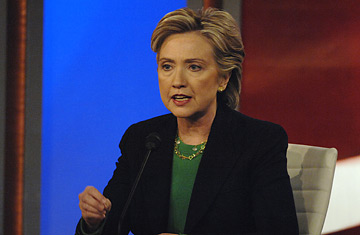
Democratic presidential candidate Senator Hillary Clinton gives an interview.
(2 of 3)
So much has been made of how you choked up. I was sort of struck, though, because this is something that men now, including your husband, in politics do almost routinely. What difference do you think that made it convey to voters the sort of real person that is there beneath the...
I think what it might have done is to put into the public arena what happens to me every single day on a private level. I have those encounters with people that touch me and really move me all the time. And usually it is when I am shaking somebody's hand on a rope line or I am in a small meeting or somebody comes up to me on the street. And I feel connected to that person, because they are worried they don't have health care. They are losing a job or some other problem that they are hoping that I will not only be empathic about and relate to, but actually try to help them overcome.
And I think what that moment really illustrated is — guess what? Those of us who get up on the stage and make the speeches and shake the hands and do the interviews, are also human beings. And the empathy goes both ways. I really felt touched when that woman said "Well how are you?" because it said to me that she was seeing me as a human being as I had been seeing her and all the people there. And it's that kind of connection that I think is a very strong basis for us to go forward together.
Could you talk about what the road looks like ahead because I think that what the split decision suggests is that this is going to go on for a while. It's going to go at least until February 5th, and it may go a little further than that. Do you look at the race differently now and is this causing you to sort of reassess how you pace it, how you fund it, how you plan the map?
You know, not really because I always assumed that it would go at least through February 5th. That's what we have been planning for. It is what I started doing when I began putting people in various states and asking key leaders to assume responsibility for what we were going to try to achieve. It is just too compressed a schedule to believe that it was going to be a smooth path. That is how I always anticipated it.
Obviously it would have been great if that had not been the case, but that sure is not what I thought and it's not what I planned for so we're going on as we had anticipated. It's a very challenging schedule for everybody. It's not something that I'm telling you that you don't know, I mean, trying to cover all this ground, give people a chance to see you there while still running a national campaign is going to be a hill to climb [laughs] but we're up to it and we're getting ready and prepared to go out and do it everywhere we need to to compete. I don't know whether it'll be finished or not but I kind of suspect it'll be decided by the close of the vote counting on February the fifth.
Well you're also bringing in what has been described to me as fresh thinking in the form of some additions to your team: Maggie [Williams, a Clinton confidante] and Doug [Sosnick, a policy advisor in Bill Clinton's White House]. What are you trying to accomplish here as you are sort of rejiggering your team?
Well, I really am facing the reality that despite the fact that it's been very costly to run this national campaign for a year, we didn't have enough people and we didn't have enough, you know, the breadth and depth to be able to cover all this ground that we have to cover. You know, just thinking about going from New York to California in three and a half weeks is [laughs] pretty daunting. So I'm thrilled to have so many of my long-time friends, people with lots of experience, coming forward and saying look we're here for you, we want to come in, we want to help the great team that you already have, we want to augment the jobs that are already being done. We've got to begin to send people around the country, which we'd held off doing because we obviously didn't want to assume those financial costs. This is all about being ready to take on what we know is going to be a nationwide spread to running across the country from the east to the west coast.
